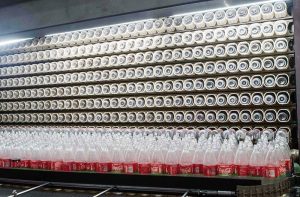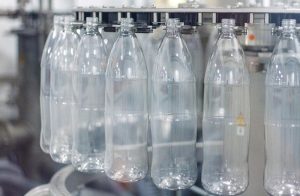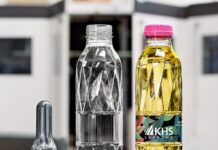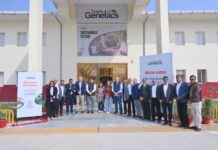
Coca-Cola Peninsula Beverages (CCPB) consistently focuses on reducing its footprint in a region where climate protection is already a matter of survival. This South African bottler gets support through resource-saving technologies from KHS – made in Germany.
Although there are still some people who express doubts about climate change, large parts of Africa, in particular, have long been suffering from its very palpable effects. Steadily decreasing rainfall and rising temperatures have been causing devastating droughts and extreme famines since 2015, especially in the southern part of the subcontinent. Malawi, Zambia, Namibia, Zimbabwe, and Botswana are among the countries affected.
Water crisis

South Africa – a country more associated with the lush green fruit and wine-growing regions of the Cape region and the eastern coast’s subtropical forests – has also been hard hit by the absence of the usual summer precipitation. All the more surprising was the world’s reaction at large to the water crisis in Cape Town, which brought the metropolis to the brink of disaster in early 2018 – the shutdown of the public water supply. “We were very close to Day Zero,” recalls Greg Morse, manufacturing and supply chain director at CCPB, the region’s leading soft drinks bottler. “From this point on, each person would’ve only been allocated 20 liters per day which they would’ve had to stand in line for, armed with plastic containers.”
Focus on sustainability
As large water consumers, beverage bottlers such as CCPB are particularly scrutinizing the public in situations as dramatic as this. “We’re of course expected to set a good example,” explains Morse. “We have to be accountable to our customers and the public – not only in times of crisis, but every single day.”

The beverage manufacturer sees the awareness of corporate social responsibility as a key success factor for a very good reason. “The full focus is on sustainability,” Morse emphasizes. “We’re working relentlessly to minimize our carbon footprint at all levels. We started doing so in the early 2000’s by combining the four manufacturing plants within our territory to form a mega manufacturing facility in Parow Industria, a suburb to the east of Cape Town.”
Today, this includes activities such as Coca-Cola’s “World Without Waste” program, with which, by 2030, the company plans to collect and recycle as many bottles and cans from refuse as can be sold worldwide. CCPB is involved, for example, in organizations that want to expand the recycling of PET and glass bottles in South Africa. This is a logical step considering that the bottler makes its preforms and is desperately searching for rPET to achieve its goal of using an average of 25% recycled material. Even the PET bottles for the Bonaqua water brand are made of 100% recyclate.
Returnable bottles benefit all

CCPB’s sustainability strategy also includes using more returnable bottles made of both glass and plastic than some of its competitors: the share of the product range is currently around 20% and should reach 40% by 2025. This significantly helps prevent waste and thus achieve ecological sustainability but is also viable from an economic standpoint. If a refillable PET bottle is returned, the product is sold for about 30% less, benefiting price-sensitive consumers and the company itself. In doing so, it’s able to reach wider groups of buyers.
The returnable PET bottles are produced on a KHS InnoPET Blomax V stretch blow molder put into operation in 2019 – one of the first-ever on the market. According to the company, it scores above all with resource savings and a production process with a significantly smaller carbon footprint. Due to its optimized near-infrared (NIR) heater, this machine from the latest generation of KHS stretch blow molders consumes up to 10% less energy. The AirBackPlus air recovery system, also included in the returnable bottle blowing process, uses up to 40% less high-pressure air. The new technology also saves on resources for material consumption: the improved material distribution of the stretch blow molding process now uses the PET located below the neck ring that to date has remained unstretched, enabling lighter preforms to be used.
Trust in technology
“We’ve had a good business relationship with KHS for more than forty years,” is how Morse describes relations with the Dortmund engineering company. “We purchased fillers from KHS, for instance, even back in the days of predecessor company SEN. And if bottle formats like the 1.0-liter glass bottle were still on the market today, I’m certain that the machines would still be in operation.”
“We don’t limit ourselves to just delivering machines,” explains Stephan Mürset, regional sales manager at KHS. “We maintain an intensive dialog on an equal footing and understand the specific needs of Greg and his colleagues, for example concerning matters such as CCPB also producing bottles for other bottlers. We have a very similar understanding of technical issues.” Morse confirms that they’re on the same wavelength. “The price isn’t our sole guideline; we buy from people. Of course, the technology has to be right; we were really impressed by the simple functionality and downright solidity of the equipment we saw in action at the KHS factory,” he adds.
However, the good relationship thrives not only on sophisticated technology but also on the system provider’s strong service presence in South Africa. “We have a very efficient team here at the Cape,” emphasizes Mürset. “Our local engineers carried out the installation and commissioning work.” The highly competent specialists, some of whom were trained in Dortmund and some at KHS’ training center in Johannesburg, are also available during ongoing operation for audits, maintenance, or repairs.
Water management
Water-saving technology helps in the production process – this modification was completed with two new bottle washers the Dortmund system provider installed and put into Parow’s operation last year. One of the machines processes returnable PET at respective capacities of up to 26,400 1.5-liter bottles an hour and up to 19,200 2.0-liter bottles an hour. The other washes up to 36,000 returnable glass bottles an hour with volumes ranging from 300 to 500 milliliters. Due to several innovations, each of the two uses about 25% less water than their predecessors. Based on this investment and several other measures with which CCPB achieves remarkable results, they have helped to save on resources by reducing the water consumed per liter of finished beverage from 3.6 liters to 1.7 liters within the past twelve years, said KHS.
IndiFoodBev — authentic, impactful and influential
An English-language food and beverage processing and packaging industry B2B platform in print and web, IndiFoodBev is in its third year of publication. It is said that the Indian food and beverage industries represent approximately US$ 900 billion in revenues which implies more than 20% of the country’s GDP. Eliminating the wastage on the farmside can help to deliver more protein to a higher number of the population apart from generating sizable exports. The savings in soil, seeds, water, fertilizer, energy and ultimately food and nutrition could be the most immense contribution that country is poised to make to the moderation of climate change.
To improve your marketing and grow sales to the food and beverage processing and packaging industry, talk to us. Our research and consulting company IppStar [www.ippstar.org] can assess your potential and addressable markets in light of the competition. We can discuss marketing, communication, and sales strategies for market entry and growth.
Suppliers and service providers with a strategy and budget for targeted marketing can discuss using our hybrid print, web, video, and social media channels to create brand recognition linked to market relevance. Our technical writers are ready to meet you and your customers for content.
The second largest producer of fruit and vegetables in the world is continuously expanding processing capacities and delivery systems with appropriate innovative technologies. We cover product and consumer trends, nutrition, processing, research, equipment and packaging from farm to thali. Get our 2025 media kit and recalibrate your role in this dynamic market. Enhance your visibility and relevance to existing markets and turn potential customers into conversations. Ask for a sample copy of our bi-monthly in print or our weekly IndiFoodBev eZine each Wednesday.
For editorial info@ippgroup.in — for advertisement ads1@ippgroup.in and for subscriptions subscription@ippgroup.in
Naresh Khanna – 10 February 2025
Subscribe Now










